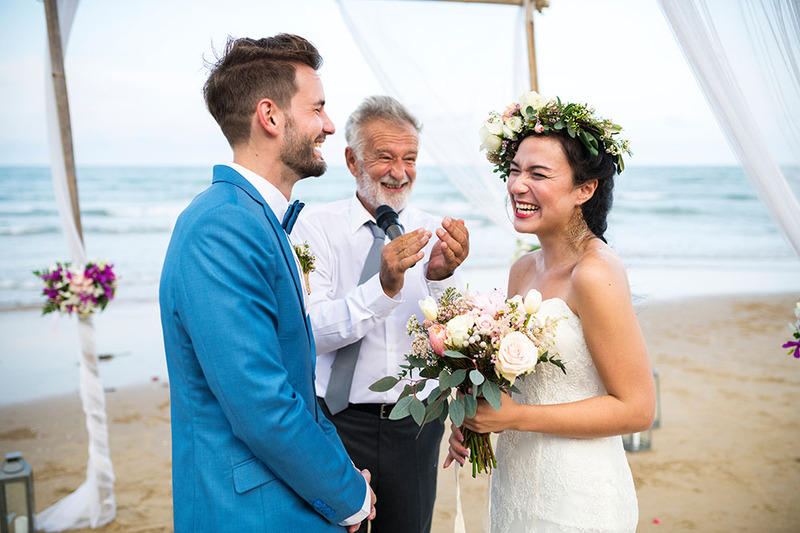AMERICAN WEDDINGS BLOG
Stay up to date with the latest wedding ceremony trends, script writing inspiration, tips and advice for first-time officiants, and news that matters to couples and wedding ministers.
Stay up to date with the latest wedding ceremony trends, script writing inspiration, tips and advice for first-time officiants, and news that matters to couples and wedding ministers.
Published Thursday, Dec. 7th, 2023
Last updated Thursday, Apr. 3rd, 2025

Weddings performed in churches or temples are officiated by clergy belonging to specific faith denominations, but who officiates civil weddings for nonreligious, agnostic, or atheist couples?
If you’re not religious and want to have a civil or secular marriage ceremony, you have several great options for officiants. Consider the three suggestions below to get started and choose the best officiant for you and your wedding.
Friends and relatives can get ordained online through American Marriage Ministries (AMM) for free to officiate your wedding as an AMM minister. They don’t have to hold any specific religious beliefs, or have any spiritual beliefs at all, to become ordained with AMM, making this the perfect choice for choosing a secular officiant! (Atheists and agnostics are welcome!)
|* mop-button *|
All that’s required for ordination is belief in AMM’s three tenets, which are founded in marriage equality for all people:
1. All people, regardless of race, gender, or sexual orientation, have the right to marry.
2. It is the right of every couple to choose who will solemnize their marriage.
3. All people have the right to solemnize marriage.
Your loved one can perform any type of wedding ceremony you want – in almost any location, and including any wording, special readings, or unique traditions you want. They may need to register with the clerk’s office ahead of time, but this only applies in some states. After the ceremony is complete, they have the legal authority as a minister to sign your marriage license.

Secular wedding officiant: Ask a close friend or relative to get ordained online to officiate your wedding exactly how and where you want it to be. This is the perfect way to choose a secular officiant! Someone will honor your values, understands what makes you special as a couple, and who can speak from the heart when delivering your wedding ceremony. (Photo: Anchiy / iStock)
Many courthouses and county clerk’s offices offer marriage ceremony services. A courthouse wedding is usually officiated by a judge, county clerk, or city clerk, who is familiar with the legal requirements.
During the ceremony, they’ll read from a simple script, ask if you wish to marry (the declaration of intent, or the familiar ‘I do’s of weddings), and pronounce you married. After the ceremony, they’ll sign your marriage license.
Contact a location directly to find out if marriage services are offered there, and ask about civil ceremony fees.
You can hire a professional wedding officiant to perform your ceremony, who often specialize in specific types of ceremonies, including secular and civil weddings. Secular wedding officiants must be authorized to officiate marriage ceremonies in your state. Choosing a secular officiant lets couples pick their own ceremony scripts, vows, and songs.
If you decide to go this route, interview a few potential officiants to determine how well they’ll fit your needs. Ask if they’re comfortable performing a non-religious wedding, and discuss any phrases or words you want to avoid during the ceremony (such as ‘holy matrimony’ or ‘sacred union, which have a religious connotation).
Related: Are there legal wording requirements in a wedding ceremony?
You can search for professional officiants online using Google Business Profiles (just type in “wedding officiant near me”) or on vendor websites like The Knot, Wedding Wire, The Officiant Directory. Wedding planning forums on FaceBook, Discord, and others can also be a good place to start; talk to other soon-to-be-weds and newlyweds for recommendations.
Consider these resources to get started:

Use one of our sample wedding ceremony scripts to get started planning the perfect wedding.
Love it? Pin it!
Become a Wedding Officiant with Our Free Online Ordination!